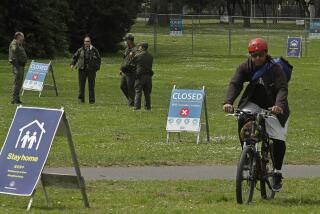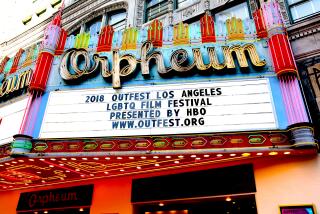Chamber Report Examines Festival Fiasco : Revenue: GlenFest ’93 was supposed to bring in $1.6 million but ended up losing $230,000. A task force describes how it happened.
- Share via
GLENDALE — Calling GlenFest “a failure of major dimensions,” a scathing report on the May festival says organizers proposed an overly ambitious street celebration yet never followed through on the simplest of plans such as selling tickets or finding volunteers.
A Chamber of Commerce task force investigated the festival, which was sponsored by the chamber, after the event compiled a deficit of almost $230,000.
The task force concluded that GlenFest ’93 “was a textbook case of how not to manage a major community event.”
GlenFest had been billed as “a truly sensational street celebration,” one that would draw more than 100,000 people to downtown Glendale for three days of live entertainment and a sampling of the finest foods from the most popular restaurants in the Los Angeles Basin. It was expected to bring in more than $1 million and “destroy the image of Glendale as a snooty, boring suburb,” chamber officials said at the time.
In the end, the festival, held May 14-16, was “an admirable dream which grew beyond the reach of the dreamers,” said Patrick Liddell, newly installed chamber president and a Glendale attorney who led the task force.
“There is plenty of blame, or responsibility, to go around for everyone,” Liddell said.
The investigation was “a very painful process” and the public disclosure, “tough but fair,” he said.
Liddell, who was installed last Thursday as chamber president, promised that GlenFest ‘94--if one is held--will not repeat the same mistakes. The chamber board of directors is expected to make a decision in August.
“It was just too grandiose a scheme,” said Ginger Bremberg, a former City Council member who cast the only vote opposed to allocating an estimated $65,000 in city staff time and services to help produce the festival. “They got carried away.” The chamber paid most of the $614,497 expense in putting on the festival. Organizers had hoped that the celebration would bring in $1.6 million, with the profit spread among the chamber, local charities, restaurants and other businesses.
The loss was so great that there was speculation among some in the community that the chamber would have to sell or mortgage its headquarters to recover. However, Liddell said the chamber’s reserves, accumulated over the years, are sufficient to cover the losses and still leave a balance of about $40,000.
Actual losses have not been finalized. A full external audit is scheduled to begin this week, Liddell said.
Task force members said the goal in their investigation was not to point fingers of blame at individuals, but to find out what happened and how it happened.
The report notes that the festival was the brainchild of the immediate past president of the chamber, Hamo Rostamian, a Glendale real estate broker.
Rostamian, who assumed the one-year chamber leadership a year ago, said “the concept of GlenFest crystallized” after a series of “brainstorming sessions with 50 or so individuals from different types of businesses and different walks of life.”
The street festival originally was proposed in 1991 as a food fair at which local restaurants would offer samplings from their menus and entertainment would be provided for free.
But under Rostamian’s leadership and with the endorsement of the majority of the 27-member chamber board, the street festival grew into a major production. Rostamian said the scope of the project was intended to compete with the many other activities offered on any particular weekend in Los Angeles.
There were to be five stages with live entertainment, including a 6,000-seat venue offering six major concerts over the three-day festival at a cost of $20 per seat per concert. A $5 admission would be charged to enter the festival. Scrip, or tickets sold within the festival to be used in place of cash, was to be required to purchase food and other vendor products. The chamber would take 30% to 40% of the money from sales of scrip.
“If everything had worked, we would have gained $200,000 or so,” Rostamian said.
But almost nothing worked, according to the task force report.
Volunteers and paid organizers were slow in planning. The sale of tickets to the major concerts was a disaster; charitable organizations were supposed to sell the tickets in blocks and receive a percentage, but the chamber never involved the organizations in the planning or helped them sell advance tickets, the report said. As a result, only 532 had been sold a week before the event, where 29,000 sales had been expected. The concerts were canceled and tickets refunded.
An estimated 600 volunteers would be needed to run the event, take admission, sell scrip and direct parking. But leaders discovered just four days before the festival that none of the dozen appointed committees had taken charge of the volunteer assignments.
Leaders scrambled desperately to recruit volunteers at the last minute, but only 25 workers showed up at a briefing the night before the festival opened, resulting in “severe understaffing,” the report said. About 200 volunteers are thought to have eventually showed up--about a third of what was needed.
According to the report, the volunteer system “broke down almost immediately” and resulted in “utter chaos.”
Color-coordinated T-shirts designated for particular assignments were not distributed as planned, radio communications disintegrated, stamps ran dry, punches were lost, booths ran out of change and the systems for monitoring entrance and for keeping alcohol out of the festival failed. People began entering for free, and drinking in the four-block area of the festival became a problem. Parking control failed, the shuttle buses were canceled and motorists began jamming private lots.
“Many of the volunteers felt mistreated, walked off their jobs and did not return the following day,” the report said.
Attendance at GlenFest was estimated at anywhere from 35,000 to 75,000, but only about 21,000 paid admission. Total income for the event was $385,251, which included $105,231 from ticket sales and $188,196 from scrip sales. The rest came mainly from booth rentals, sponsors and banners and a children’s area, according to the report.
Many of the 40 restaurants that participated--far below the number originally expected--accepted cash rather than the scrip that they were supposed to. That cost the chamber unknown thousands of dollars in lost receipts, Liddell said. The chamber is now asking restaurants to voluntarily pay their estimated share.
Many businesses in the festival area complained that their numbers of customers actually fell during the event’s three days.
The task force investigation found no basis for community accusations of individual financial gain at the chamber’s loss, but did recommend further police investigation of possible theft of some cash receipts. At least one volunteer, according to Liddell, was stopped after allegedly pocketing cash from the sale of scrip.
However, Liddell praised workers who gave time and effort to the festival. “If the event had been a great financial success, many people would have shared the credit,” Liddell wrote in a cover letter to chamber directors.
“If those who staged GlenFest failed, it was because they dreamed big dreams for Glendale, believing that this special city deserved an event of unusual dimensions,” according to the report. “They should not be taken to task for their optimism, their large vision of Glendale or the countless hours that they volunteered so selflessly.”
In retrospect, examiners found that “the lack of a clear vision resulted in an event which neither made money nor brought glory to Glendale.”
Glenfest Finances Revenue Ticket sales: $105,231
Scrip sales: $188,196
Rentals, sponsors: $91,824
Total income: $385,251
Expenses Overhead: $383,715
Major venue: $230,782
Total expenses: $614,497
Bottom line Total expenses: $614,497
Less income: $385,251
Net Loss: $229,246
More to Read
Sign up for Essential California
The most important California stories and recommendations in your inbox every morning.
You may occasionally receive promotional content from the Los Angeles Times.













